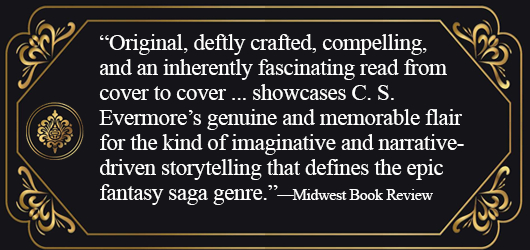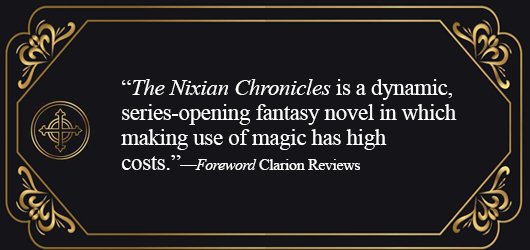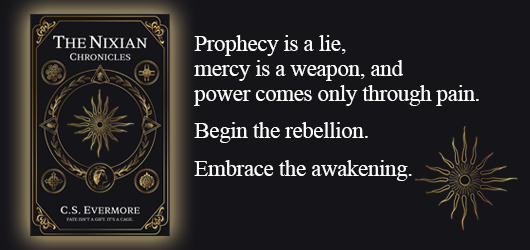A Mind That Redefines Fate—and What It Costs
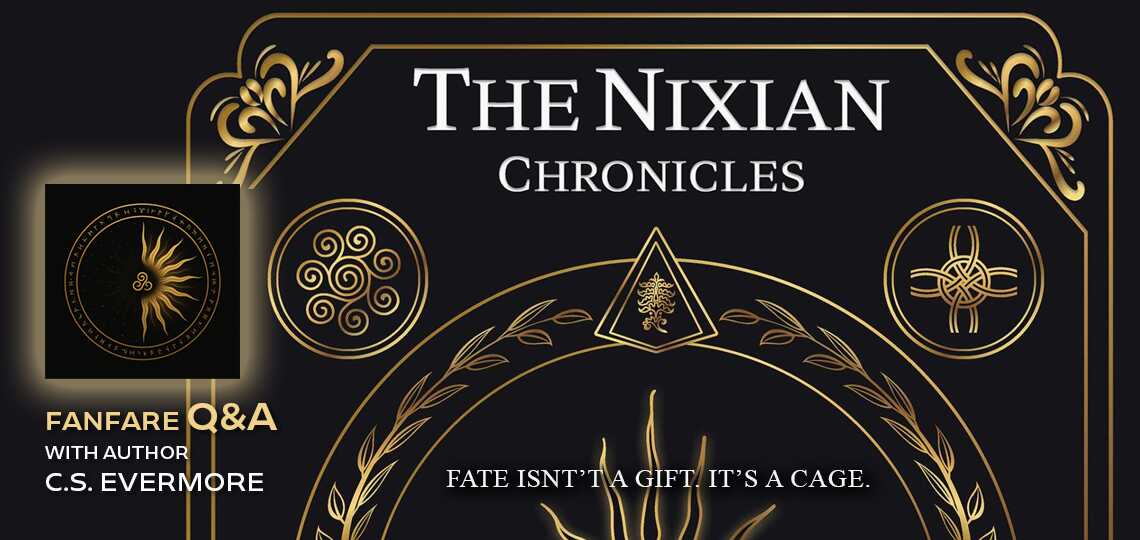
Reviewer John Murray Interviews C.S. Evermore, Author of The Nixian Chronicles
In recent years, we’ve spent enough time with fantasy novelists and their works to know that some of the most exciting new books in publishing are coming from that particular genre. Not just tales of magic and wildly imagined worlds, the best fantasy novels excel in all aspects of storytelling—character development, sophisticated plotting, moral/ethical complexity, and wordcraft—so that discerning readers of any type of fiction can find something to love.
C.S. Evermore joins us today to talk about their dynamic first book in the series, The Nixian Chronicles: The Awakening—a dark, psychologically rich fantasy in which “a woman struggling with the weight of her destiny subverts expectations around fate, power, and identity,” in the words of John Murray, in his glowing Foreword Clarion review.
We pitched John and C.S. the idea of connecting for a reviewer-author conversation and they readily agreed. As you’ll see, Evermore moves effortlessly between psychology, philosophy, and human duality, speaking with the same depth, intensity, and passion that define her world-building and exploration of powers.
Enjoy.
What inspired the central idea that prophecy could be a deliberate lie rather than a guiding truth?
The seed came from my own wrestle with faith. I grew up hearing, “There’s a plan for you—don’t question, just trust.” But in the hardest seasons of my life, that phrase felt less like comfort and more like silence I couldn’t make sense of. I never stopped believing there is a plan, but I also couldn’t ignore the what ifs.
What if the words we cling to as hope could also be twisted by the wrong hands? What if prophecy, in the wrong voice, isn’t meant to guide you, but to keep you in place?
That became the heartbeat of my story. Not to tear faith or systems down, but to ask: how do you tell the difference between guidance that frees you and guidance that cages you?
It is my hope that as readers step into The Nixian Chronicles, they see reflections of their own lives. Because my world is a mirror to ours: power, prophecy, even ideals are neutral things—but in the wrong hands, even the noblest systems can be twisted into chains. The stories are my way of offering myself grace, and in that offering, perhaps others who have been quietly wrestling with their own what-ifs will feel a little less alone.
How did you develop the magic system of Shadowflare, and what influenced its destructive, emotional nature? Did you model its effects on any real-world psychological or physical phenomena?
Shadowflare is the superpower I imagine for myself if powers were real. At its core, it embodies duality—the heartbeat of everything in our world. Nature itself is proof: it heals, provides, and offers beauty, yet it also carries tornadoes, floods, and fire that consume without mercy. Even fire alone is a paradox: it can cook a comforting meal or raze a home.
From that lens, Shadowflare was born: light embodying mercy, shadow embodying destruction. But I didn’t want it to be flat or two-dimensional, so I asked—what if it were sentient? What if it could sense when to soothe and when to devour? Because duality isn’t just in nature—it’s in us: sentient beings who carry both light and shadow within, deciding which takes the spotlight, and when.
That balance is the essence of Shadowflare. My goal isn’t to make shadows something to fear or to glorify light, but to reveal the beauty in both. In the books I often describe it as light and shadow dancing together in rhythm—never colliding, never opposing. Because when kept in balance, shadows too can offer relief and comfort, even when wrapped and presented with a bow of blades. For instance, sometimes shadow is the only way to protect what we love. If someone broke into your home with intent to harm your family, light alone wouldn’t save them. In that moment, unleashing your shadowed side is the very act of mercy.
And the reverse is true: light is not always gentle. Sometimes it offers destruction packaged with a pretty bow of silk. Mercy, left unchecked, can wound just as deeply as ruthlessness. In that same moment of danger, if light alone held the reins, your family’s doom would be sealed.
As in that example, both sides offer a variant of mercy, but it is up to us to choose how far we lean into either side, wouldn’t you say? That is the fire behind Shadowflare. It’s why it is so powerful—and so feared. If bonded to one who does not yet have full command of both their light and shadowed sides, it could very well be destructive as the sea.
The city of Eldoria feels ancient and layered with history. How much of the world-building was planned in advance versus discovered during writing?
Only about 10 percent of the world-building was planned—the foundation I needed to show balance: the dark side of beauty and light, as well as the comfort and enlightenment that can be found in the shadows. The other 90 percent unfolded as the story evolved. I kept asking myself: what kind of world would I want to live in if magic were real, and what do I want my readers to feel? What themes am I trying to convey?
If you pay close attention, while Eldoria itself doesn’t change, its descriptions do. The city bends with emotion: grief dulls its edges, joy makes it shimmer, tension sharpens every detail. That was intentional, I wanted the world to become a mirror of what the characters feel, so readers can experience those emotions not just through the people, but through the streets they walk.
I also drew inspiration from real cities I’ve visited and shows I’ve watched. Street foods, bustling markets, underground speakeasies (fun fact: the speakeasy idea was sparked by an episode of Riverdale)—all of these found their way in. But what readers glimpse in The Awakening is only the tip of the iceberg.
Book 2, The Nixian Chronicles: Fate’s Deception (coming November 7th, 2025), pulls them deeper. This time, they’ll taste the food, breathe in the scents, and step fully inside the speakeasy, where a siren named Night-Weave sings an in-world song. And by “sing,” I mean literally—the song Selayaen was composed and brought to life as an audio track, now available on YouTube for readers to experience in the exact moment it appears in the story, or whenever they wish. Here’s the link if you’d like to give it a listen.
The language Nixael came from my need to create something that breathes heart and soul, sounds beautiful, but is also heavy with history. English, while powerful, couldn’t fully carry the depth of the highly emotional and heavy scenes. That’s why Nixael appears only in the most emotional scenes (fun fact: many of those were written during some of my own most emotional moments, when I poured in everything I was carrying, even the words I wished someone would say to me). At its core, the language is vowels, sound, and emotion woven together.
My world building doesn’t stop within the story—it extends to the covers themselves. Every element is intentional. For keen readers, each design reveals part of the story before a single page is turned. The series title, The Nixian Chronicles, always stands front and center because the saga is one continuous narrative. Each subtitle—The Awakening, Fate’s Deception, and those that follow—marks a chapter within that larger myth, appearing in the metadata, on the spine, and within the interior rather than as competing main titles. Thus, the readers always know they’re stepping into the same living world, just a different stage of its unfolding.
Not to fret though, the readers can still tell the difference between each volume just by looking at the covers through the tagline, each is unique and telling plus the cover art, always distinct, yet sharing elements of the world.
For readers who love decoding symbolism, I’ve shared a deeper look at every emblem, glyph, and choice in the blog post Unraveling the Symbolism of The Nixian Chronicles Book Covers (Part I).
Several lines in the book read like moral proverbs—were those planned from the start, or did they emerge naturally from the characters’ perspectives?
They weren’t planned at all, but they didn’t all emerge from the characters’ perspectives either. Some were born from my goal to foreshadow, and others came from my own beliefs and the endless debates I hold with myself. Here are a few examples: “You speak of mercy like it was a gift. But mercy from a machine isn’t mercy—it’s programming.” This line, spoken by Riven, rose directly from his perspective. Riven is a rogue scholar who was once a top-ranking Veiled Dominion Sentinel. He walked away after realizing their only priority is order, even when it comes at the cost of lives. Their rule in Eldoria is marked by fear that can never be justified, and a genocide that nearly erased an entire race. To him, compassion is a foreign concept for the Veiled Dominion. They are like machines: devoid of humanity, locked to a single setting.
“Even light can blind.” This line is repeated twice in the book: first as foreshadowing of a coming threat, and later as a grounding of that earlier moment, a second breadcrumb preparing readers for Lyara’s true awakening.
“Even mercy must be mastered.” This one didn’t come from a character but from me. It lived in my thoughts long before The Nixian Chronicles ever existed—rooted in my reflections on human duality and the constant wrestle for balance.
The book avoids the traditional “chosen one” trajectory. Was subverting fantasy tropes an intentional goal from the outset?
Yes, absolutely. The seed of that decision actually came while I was watching The Flash. As much as I enjoy and respect traditional chosen-one stories, I often find myself asking: what if the chosen one is really just a pawn in someone else’s game?
Think about it: the pattern is almost always predictable. Someone wakes up to find they’ve been given great power. They’re told they’re the one who must save the world. They sacrifice their own needs in a never-ending battle to protect people. But no matter how much damage the villain causes, they’re never truly stopped, because killing them would fracture the hero’s “goodness.” Meanwhile, innocents continue to suffer—sometimes even the hero’s own loved ones. And somehow, against all logic, the hero still emerges triumphant—hands clean of the villain’s blood, yet ignoring the stain from the countless innocents they allowed to die because their focus was damage control, not prevention. The idea that in the end, maintaining their “purity” will trump the cold, calculated intelligence most villains display continues to persist—reflecting our own tendency to believe purity can conquer pragmatism, even when reality proves otherwise.
It’s in those moments I remember Einstein’s words: “The world is a dangerous place to live, not because of the people who are evil, but because of the people who don’t do anything about it.” So what if the true villain in those stories is, in fact, the ego that fuels the hero’s need to stay pure?
Don’t get me wrong—there’s nothing inherently wrong with their predictability or their distance from reality; it can even be cathartic. I’ve binged and loved plenty of those stories. And I believe in mercy; I love that it often forms the heart of their plots. But mercy without discernment can be a dangerous, double-edged sword.
At its heart, the entire Nixian Chronicles series (not just The Awakening, Book One) isn’t about subverting tropes for the sake of it—it’s about offering a mirror. A fantasy world that carries magic and wonder, yes, but also the unpredictability, complexity, and moral tension of reality. The goal of the narrative is to make readers feel, “This could be me.” A story that surprises even the sharpest predictor, one that constantly forces the question: what happens next? And just as importantly, one that challenges them to step into the shoes of different characters, to see situations from their perspectives, and to ask themselves: would I make the same choice?
The Veiled Dominion has a strong ideological bent. Did you draw on historical or philosophical movements when creating their doctrines?
Not directly. The Dominion was born from imagining what happens when leaders believe it is their God-given right to rule, yet live in constant fear of losing that power—consumed by an obsession with control and order. Their grip is sustained as much by fear as by dominance.
Malakar, their High Inquisitor, embodies this most fiercely, but his story runs deeper than book 1 reveals. In Fate’s Deception (book 2), readers begin to uncover the “why” behind his obsessive, single-minded cruelty, and in book 3, his arc is completed. The choice to delay the reveal is deliberate to achieve two goals.
First, I want readers to form strong feelings toward him in The Awakening—to wrestle with the mystery of what could have forged such a man. When no answer is offered, the silence itself becomes part of the tension. It is also important that they feel drawn toward trying to understand him, to revel in the comfort of a familiar hero-villain arc that makes the coming twists and subversion far more delicious.
Second, Malakar’s truth doesn’t just explain him; it reshapes the larger story. Its weight belongs in books 2 and 3, where it echoes across the series’ deeper themes. You see, The Nixian Chronicles is designed like a kaleidoscope. Each book shifts the pattern, revealing new symmetries and hidden connections. The longer you look, the deeper your appreciation and understanding of its beauty. The story rewards patience—with clarity that only arrives in time.
How do you approach writing morally ambiguous characters in a way that keeps them compelling yet unpredictable?
For this, I just connect them to humanity. To me, my characters are not just words on a page; they are living, breathing beings with the complexity of life encoded into them. I believe humankind is the most unpredictable species on earth, which is why our nature is a beautiful paradox—fascinating, dangerous, yet never fully knowable. A human being can show kindness in one situation and be ruthless in another, all within the same day.
So when I write my characters, I channel all that complexity. But I also go a step further: I infuse them with traits and elements from myself—my mind, my personality, my experiences, my wishes, my emotions, my interactions. Each character in The Nixian Chronicles is a representation of some side of me, and the details of their stories are never preplanned. They evolve depending on where and how inspiration strikes. Their reactions, their choices, even their interactions with others are almost always decided in the moment, according to the side of me I’m channeling into them. And yes, that includes stepping into the shadows. My imagination often wanders the darker corridors of humanity too.
Once, while joking with my husband, I laid out the perfect heist plan after complaining about how sloppy real criminals can be—he actually got concerned before realizing it was a joke. His exact words were, “And this is why I will not teach you how to hack.”
Another element I consider is that some situations in life simply have no clean answers, no paths to clean wins. I often think in terms of the Trolley Problem, the classic thought experiment: should you divert a runaway train to kill one person in order to save five, or do nothing and allow the five to die? In my stories, I often put characters into dilemmas like that, where there is no true winning path, only surviving the best they can.
I guess that is how I’m able to keep them compelling yet unpredictable.
Without giving spoilers, what should readers be paying attention to in this book that will matter even more in the next?
Readers should pay attention to the small details that might be dismissed as insignificant precisely because they don’t occur often, or because they don’t come with neat resolutions in book 1. For instance: the visions Lyara has, the words spoken by Shadowflare, the rare moments when Malakar almost breaks character, and even his mannerisms in general.
They should also pay close attention to the flow of the story all the way to the end, for it is a mirror to a much greater game. Think of The Awakening as an amuse-bouche before the entrée—rich with strategy, seasoned with manipulation, glazed in beauty, yet only the beginning of a far more filling meal.
These are some of the things in book 1 that will definitely matter in Fate’s Deception (book 2) and some will even carry weight into books 3 and 4.
What was the most challenging scene to write in terms of balancing action with emotional weight?
The fight scene in chapter 10 was the most challenging, because I wanted to find the right balance between action, pacing, and emotional weight. I didn’t want it leaning too far to one side. In my original draft, I had this elaborate choreography mapped out, but when I layered in the emotion, it dragged the scene down. So, I cut back on the movement and let the emotion lead.
What made it difficult was that the fight wasn’t just about spells, blades, and blows—it was about what was at stake for the characters in that moment. I needed the reader to feel both the clash of forces and the clash of hearts because the battle was not just on the outside but also within.
Thank you. Or as we say in Nixael: Thiraen, for walking this journey with me. I appreciate this opportunity to answer in a way that reflects both the story and myself.
The Nixian Chronicles
The Awakening
C. S. Evermore
C. S. Evermore Publishing (May 25, 2025)
Clarion Rating: 4 out of 5
The Nixian Chronicles is a dynamic, series-opening fantasy novel in which making use of magic has high costs.
Wielding magic requires sacrifices in C. S. Evermore’s lyrical fantasy novel The Nixian Chronicles, in which a woman with a dangerous heritage confronts a provocative prophecy.
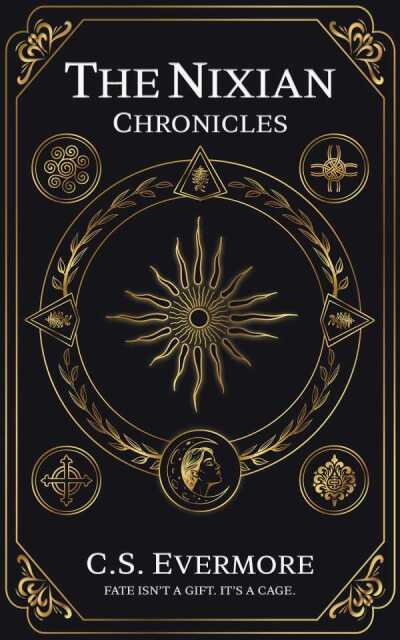
The ruthless Veiled Dominion, whose warriors rely on spells that weaken their morals, succeeded at erasing a race of beings of immeasurable power. They also enslaved the city of Eldoria. In this environment, Lyara lives a life of silence with her bloodline hidden from her, her magic suppressed, and most of the city unaware of her presence.
When a powerful storm shatters the sky and awakens the volatile magic trapped within Lyara, she learns that she’s the final element of a broken prophecy. She is to be either the savior or the destroyer of the world. Her powers grow while the city begins to question the Veiled Dominion’s so-called divine right to rule.
Lyara’s characterization is defined by self-doubt, suppressed rage, and tension between her impulses toward control and surrender. She surrounds herself with people including a morally compromised mentor who’s willing to train her in secret and a Veiled Dominion mercenary with shifting allegiances. Though she cannot trust anyone, she needs others to help her achieve her destiny.
The story moves at a fast clip, building tension and proffering new revelations as it goes. Its prose is concise and clear, though its details about the environment and people are sparse. Indeed, at times the book is too swift, as with fight scenes that conclude in a single sentence.
Still, the worldbuilding is immersive. Eldoria is established as an ancient and dynamic place whose magic system has high costs: Every spell and artifact pulls from its user, warping memories or leading to the complete loss of self. The prophecy, while it leaves Lyara feeling chained, also forces her to grow. Indeed, the ways in which she responds to the limitations forced upon her makes her story interesting. She knows that she’s on a path toward saving or destroying the world, but she resists apathy and fights to make her own choices.
This series-opening novel ends with the fate of Eldoria still in doubt. Lyara’s growth is its primary concern: She masters her powers, attempts to discover the truth, and fights to survive the high cost of using magic. The book’s tense conclusion generates interest in her story’s continuation.
In the dark, mythic fantasy novel The Nixian Chronicles, a woman struggling with the weight of her destiny subverts expectations around fate, power, and identity.
Reviewed by John M. Murray
July 21, 2025
John M. Murray

